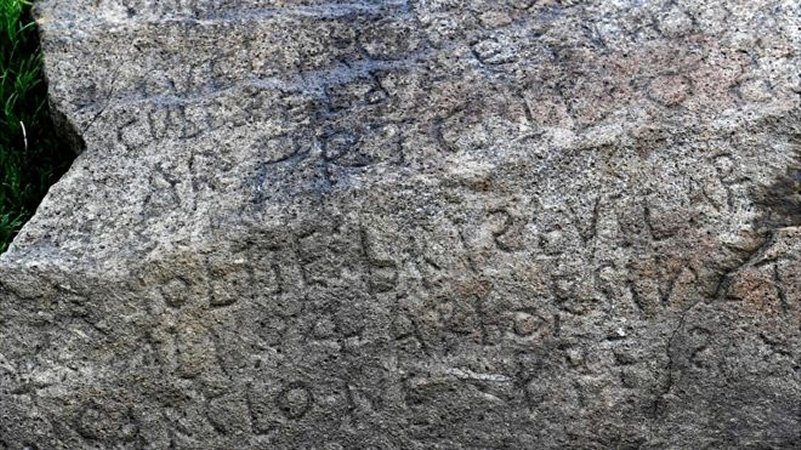Conny Waters - AncientPages.com - French experts are baffled by an ancient rock inscription found in Brittany. A reward of 2000 Euros ( $2,248) is now being offered to anyone who can solve what has become officially known as "The Champollion Mystery at Plougastel-Daoulas", honoring Jean-François Champollion, the linguist who deciphered the Rosetta Stone's ancient Egyptian hieroglyphics in the 19th Century.
French experts are baffled by this mystery inscription on a rock in Brittany. Credit: AFP
The 230-year-old inscription was found near the Brittany village of Plougastel. The message consists of 20 lines of writing. Some of the French letters are reversed or upside-down and there are also a few Scandinavian-style Ø letters.
Several historians and archaeologists have tired to decipher the message, but with no luck so far.
The years, 1786 and 1787 suggest the inscription was made some years before the French Revolution.
As BBC reports, “There is also the image of a ship with sails and rudder, and a sacred heart - a heart surmounted by a cross.
But the writing has defied all attempts at interpretation by local academics. Some think it may be in old Breton or Basque, and that the person who wrote it may only have been semi-literate.
See also:
A New Historical Inscription Of Sargon II From Karkemish Examined
Researchers Record And Interpret Sacred Cherokee Inscriptions In Alabama’s Manitou Cave
1,600-Year-Old Estate Of Wealthy Samaritan With A Rare Greek Inscription – Discovered
The letters may relate to the sounds of words as he or she heard them.
In one section the letters read: "ROC AR B … DRE AR GRIO SE EVELOH AR VIRIONES BAOAVEL".
Another reads: "OBBIIE: BRISBVILAR ... FROIK … AL".
One theory is that the inscription is linked to the building of naval defences near this point. A fort and gun emplacements - whose remains can still be seen - were erected here in the 1780s to protect the Bay of Brest. Until 1783 France and England were at war.”
"We've asked historians and archaeologists from around here, but no-one has been able to work out the story behind the rock," says Dominique Cap, Mayor of Plougastel.
"So we thought maybe out there in the world there are people who've got the kind of expert knowledge that we need. Rather than stay in ignorance, we said let's launch a competition."
Linguistic and archaeological enthusiasts are asked to register at the mayor's administration, then they will be sent photographs of the inscription. Hundreds of people have already expressed interest.
When entries close in November, a panel will choose the most plausible interpretation of the mystery.
Written by Conny Waters – AncientPages.com Staff Writer






